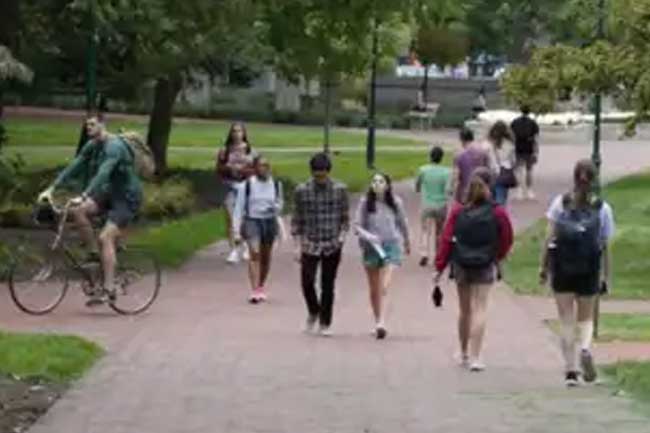President Donald Trump‘s administration has ordered its missions abroad to stop scheduling new appointments for student and exchange visitor visa applicants as the State Department prepares to expand social media vetting of foreign students, according to an internal cable seen by Reuters on Tuesday.
U.S. Secretary of State Marco Rubio said in the cable that the department plans to issue updated guidance on social media vetting of student and exchange visitor applicants after a review is completed and advised consular sections to halt the scheduling of such visa appointments.
The move comes as the Trump administration has sought to ramp up deportations and revoke student visas as part of its wide-ranging efforts to fulfill his hardline immigration agenda.
Several hundred protesters, including Harvard University students and professors, demonstrated in support of foreign students at the Harvard campus on Tuesday, while also protesting Trump administration efforts to cut off funding to the university.
In the cable, first reported by Politico, Rubio said appointments that have already been scheduled can proceed under the current guidelines, but available appointments not already taken should be pulled down.
“The Department is conducting a review of existing operations and processes for screening and vetting of student and exchange visitor (F, M, J) visa applicants, and based on that review, plans to issue guidance on expanded social media vetting for all such applicants,” the cable said.
A senior State Department official confirmed the accuracy of the cable.
State Department spokesperson Tammy Bruce declined to comment on reports of the cable, but said the U.S. will use “every tool” to vet anyone who wants to enter the United States.
Proportion of international students in the United States
More than a million foreign students enrolled in higher education institutions in the United States in the 2023-24 academic year, making up 5.9% of total enrolment – the highest share recorded to date, according to the Institute of International Education.
“We will continue to use every tool we can to assess who it is that’s coming here, whether they are students or otherwise,” Bruce told reporters at a regular news briefing.
The expanded social media vetting will require consular sections to modify their operations, processes and allocation of resources, according to the cable, which advises the sections going forward to take into consideration the workload and resource requirements of each case before scheduling them.
The cable also advises consular sections to remain focused on services for U.S. citizens, immigrant visas and fraud prevention.
Trump administration officials have said student visa and green card holders are subject to deportation over their support for Palestinians and criticism of Israel’s conduct in the war in Gaza, calling their actions a threat to U.S. foreign policy and accusing them of being pro-Hamas.
Surge in Indian and Chinese students in the United States
The number of Indian and Chinese students enrolling in higher education institutions in the United States has surged over the past two decades, now accounting for 54% of all international enrolments — up from just 25% in 2005-06
Trump’s critics have called the effort an attack on free speech rights under the First Amendment of the U.S. Constitution.
A Tufts University student from Turkey was held for over six weeks in an immigration detention center in Louisiana after co-writing an opinion piece criticizing her school’s response to Israel’s war in Gaza. She was released from custody after a federal judge granted her bail.
Last week, the Trump administration moved to revoke Harvard’s ability to enroll international students. Those roughly 6,800 students make up about 27% of Harvard’s total enrollment.
The Republican president’s administration has moved to undermine the financial stability and global standing of the nation’s oldest and wealthiest university after it pushed back on government demands for vast changes to its policies.




